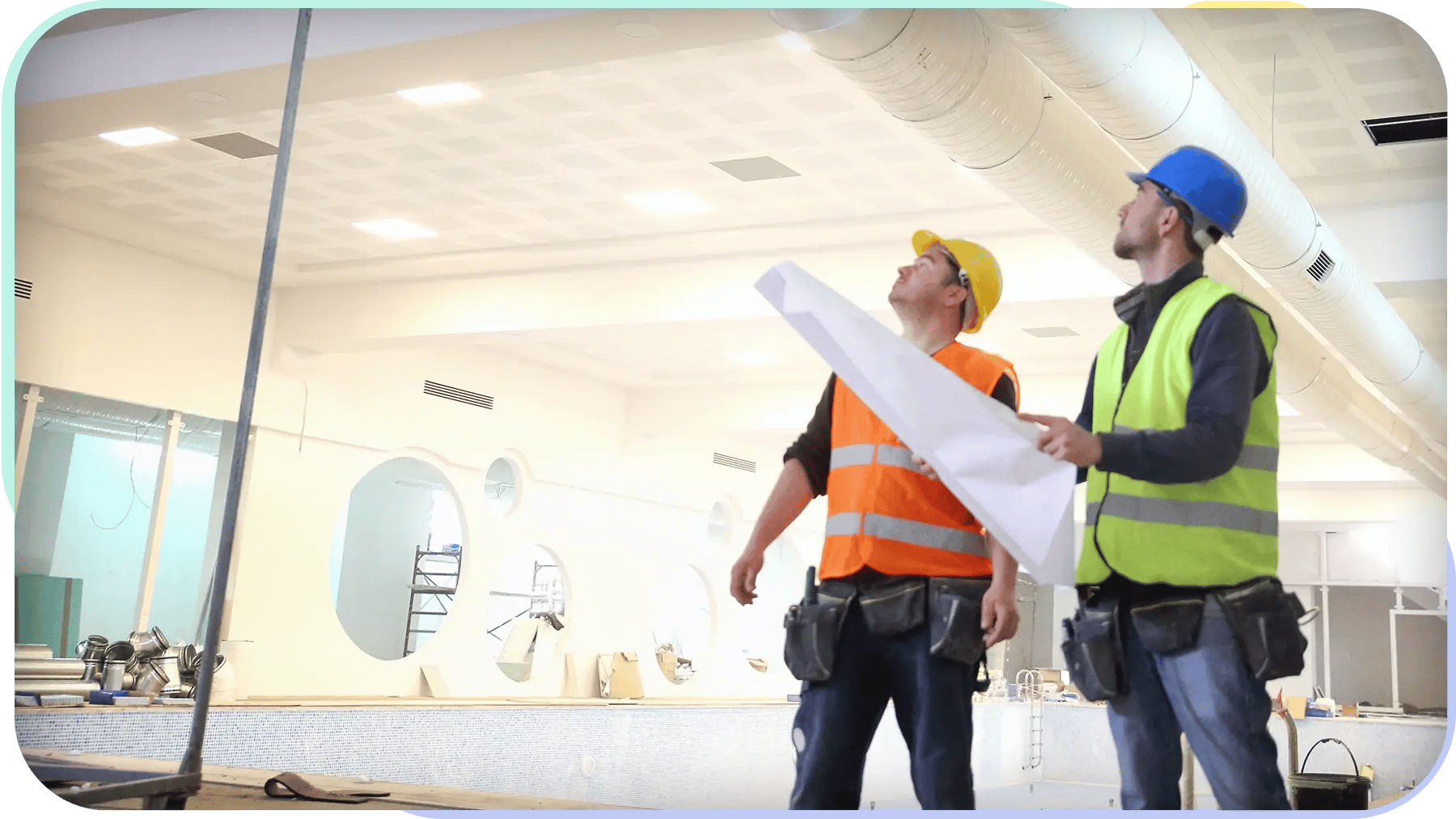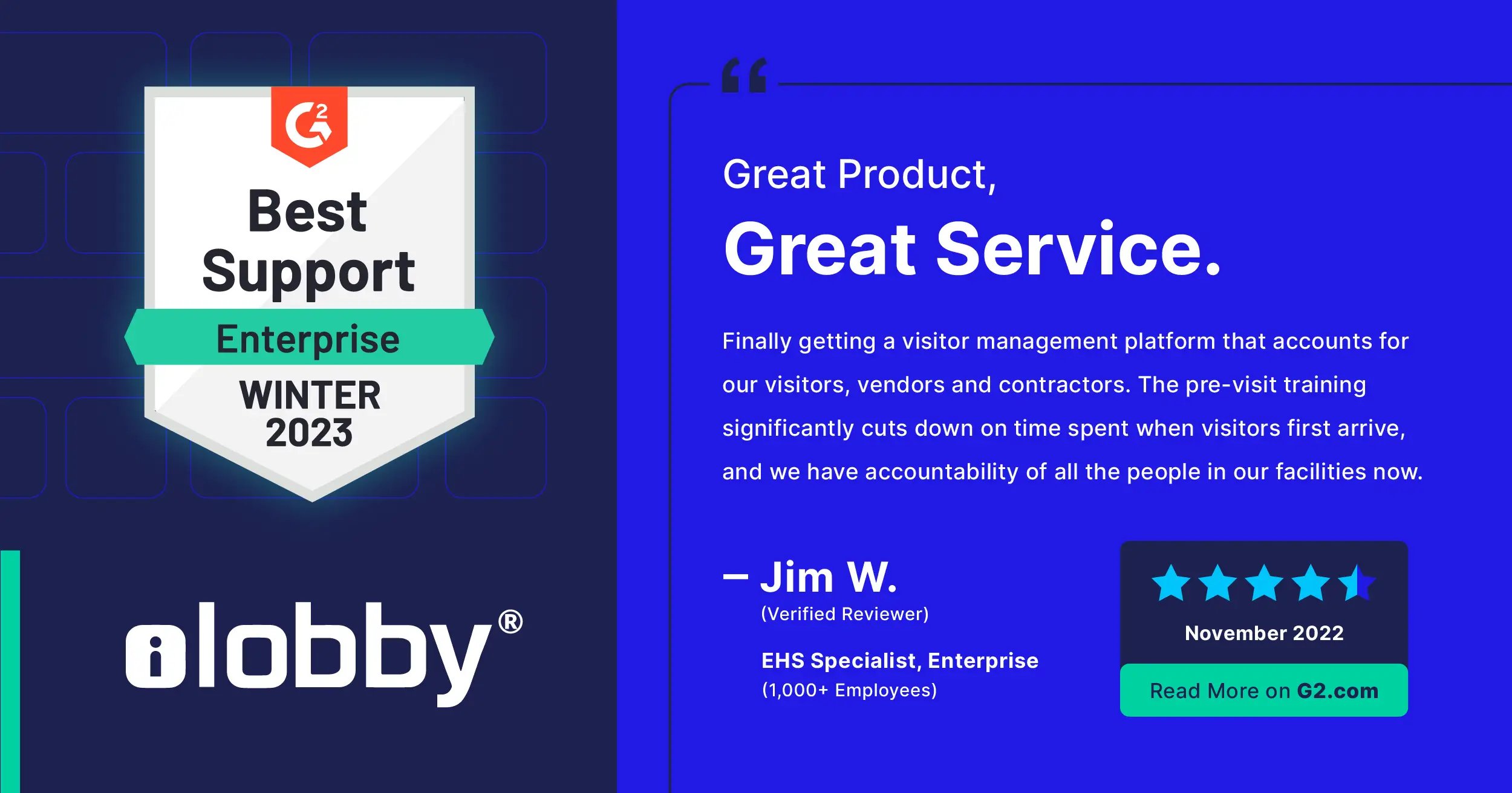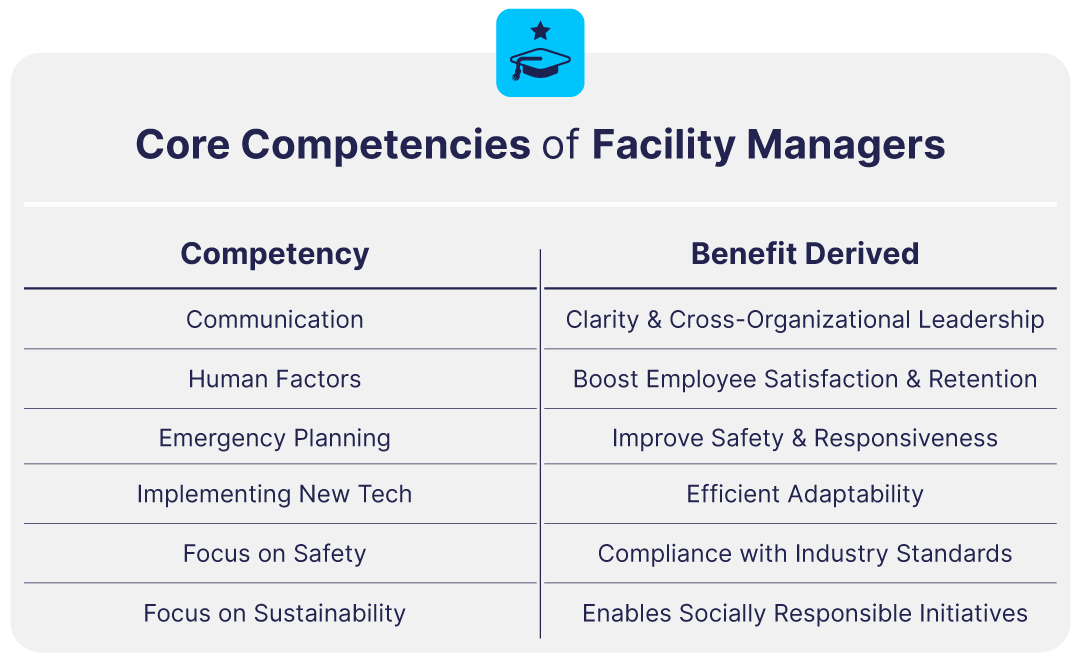- Products
- Use Cases
- Process contractors and validate credentials
- Improve facility compliance to industry standards
- Improve speed of visitor check-in process
- Screen visitors or restrict access to my facility
- Automate my reception experience
- Improve and automate my facility evacuation process
- Manage facility security across multiple locations
- Industries
- Pricing
- Resources
- Company
The Expert Guide to Leveling-Up Your Facility Manager Skills
January 16, 2023
Facility managers are responsible for the day-to-day operations of complex enterprise facilities. However, with a non-standardized role, managers may experience stagnation. To excel, they need the skills and knowledge to adapt to modern ways of working or managing facilities. That includes more modern tech adoption.
Studies say that over 54% of organizations that have invested in advanced data analytics see increased growth in revenue. Facility operations managers can significantly impact productivity with more access and training on the tools that provide facility data.
Enterprises need to invest in upskilling and reskilling facilities managers. The ability to use and understand data, as well as using implement cost-effective strategies, can improve day-to-day profitability. It also goes a long way to boost retention and enhance the quality of service.
Moreover, organizations have happy employees and customers. The impact is visible from visitors' faces to your bottom line.
This blog guides enterprises on expanding and modernizing key skills for facility managers.
Facilities Manager Skills and Competencies
Facility operators must possess a few core skill sets and competencies to ensure operations run smoothly.

Safety
One of the vital roles of a facility manager is ensuring the safety of visitors and employees. The job can be as simple as proactively reducing injury risks or as complex as emergency management planning - improving evacuation times and digitizing headcounts.
Facility operators should be able to manage a range of tasks to maximize safety, including:
- Maintaining operating systems
- Managing chemicals and hazards
- Food safety
- Managing emergencies
- Planning for disruptions
- Safe disposal of waste
- Maintaining documentation of safety procedures
- Doing daily rounds
Industry and world events influence facility managers' health and safety skill requirements. As such, they need to be agile and use systems that allow rapid implementation. For instance, during the onset of the COVID-19 pandemic, they were tasked with new health requirements. FMs used digital visitor sign-in systems to lead the charge on returning to the office.
Implementing tools like health screening questionnaires and vaccine passport scanning allowed managers to streamline a safe and easy transition back to the workplace. This was especially important in facilities where 'work from home' was never an option.
Productivity
The quality of facility management directly impacts the productivity of enterprise organizations. A facilities manager keeps things flowing smoothly for efficient, dynamic workplaces.
Modern facility operators use tools like visitor management systems (VMS) to expedite the flow of people through the building. Automated VMS reduces tedious, manual contractor and visitor sign-in processes to a few moments.
In addition to increasing efficiency, visitor sign-in kiosks reduce the number of staff required, automate record-keeping, and ease compliance. It is a must-have tool for effective facility management.
Some other key competencies and skills that allow facility managers to increase productivity include:
- Scheduling maintenance of equipment
- Ensuring good indoor lighting
- Reducing risks of errors or accidents
- Building a conducive work environment
- Establishing a chain of command for managing issues
- Managing assets
- Automating processes
- Developing continuity plans
Sustainability
Enterprises are chasing sustainability to reduce costs and environmental impact and to improve their public image.
Research shows that facility managers play an important role in implementing and running sustainable practices. Specific tasks include:
- Integrate every sustainability consideration
- Link strategy with operations
- Expand and spread sustainable knowledge
- Design sustainable efforts
- Encourage sustainability through innovation
The responsibilities of facility managers extend to numerous spheres. For example, they may conduct a sustainability audit to discover the areas of improvement.
Additionally, they may upgrade equipment to reduce the impact on the environment. For example, using energy-efficient lighting and properly insulated windows.
Moreover, they may suggest improvements in space planning. Or, they may find sustainable partners to implement sustainable procedures at the facility.
Communication
Communication skills are the bread and butter of high-impact facilities managers. They should be able to communicate with all stakeholders, visitors, employees, contractors, and vendors alike.
Moreover, they must be competent in carrying out a cross-organizational leadership role. Their work extends to several functional areas, and they must be able to motivate different teams and build relationships with vendors, contractors, and more.
Core Skills for Facility Managers to Focus On
The above are essential facilities manager skills and competencies. However, a few other skills are essential to run a productive facility.
They are as follows:
Soft Skills
People think most facility managers would find the technical aspect of facility management challenging. In reality, some of the biggest needs for FM training and upskilling are for soft skills.
Ryerson University runs a skill upgrade course for facility managers. It arranged a Program Advisory Committee (PAC) meeting, where participants discussed the skill gaps of managers.
The following stood out as the main competencies to focus on:
Communication (Verbal/Written)
Lack of communication skills is a common thread. Notable issues include an inability to express their ideas to others efficiently and give clear directions.
Few facility operators receive training in soft skills. So, they don't get an opportunity to improve.

Influencing Others
Generally speaking, facilities managers need to develop better skills to influence others. They often miss the "people" factor, a key element of facility management.
As a result, they need to become task-oriented. They also leave room to improve at motivating teams and others to give their best.
Persuasion
A similar challenge arises in the ability to persuade others. For example, FMs may lack the skills to persuade the C-suite to invest in environment-friendly practices.
A lack of persuasion capabilities can also result in poor subcontractor management. Unskilled managers may find it difficult to form long-term relationships that benefit both parties.
Understanding of Change Management
Many consider change management as a soft skill. It requires the integration of several factors to achieve organizational change. The list of factors to consider are:
- Vision of the enterprise
- Strategy
- Empathy
- Perseverance
- Insight
Most importantly, change needs the active cooperation of the people in the organization.
Unfortunately, most facilities managers need training to gain more understanding of change management. Important areas of improvement include:
- Active listening
- Research
- Strategic thinking
- Leadership
- Analysis and measurement
Soft skills impact the day-to-day operations of a facility. Facility managers needing more soft skills can develop compelling business cases, implement fewer useful plans, and struggle to manage subcontractor services.
Soft skill gaps are a major barrier to effective facility operations. Managers should consider upgrading their skills to improve performance
Hard Skills
Digital transformation has touched the facility management industry. The market for facility management software is projected to reach $64,277 million by 2032. Enterprises are investing in digital transformation.
Despite the hard numbers, facility operators frequently lack the skills to work with new tools and data. As a result, the already large technical skill gap is widening. Below is a look at some of the top hard skills to prioritize:
Ability to Understand and Use Data
The cognitive and decision-making processes of facility management now rely on technology. From IoT to Big Data, connected digital technologies are now integral to facility management. Currently, IoT spending worldwide is over $1.1 trillion.
Managers should be able to interpret and use data to optimize operations. They should be aware of:
- How to use dashboards and make the meaning of all functions
- Auto-generating reports to track performance
- Interpreting quantitative and qualitative data
Mastering data management leads to countless benefits. It reduces overall operating costs and helps the enterprise save money.
Moreover, enterprises improve building performance and quality of service. They even experience a boost in productivity

Project Management
Effective facility managers have a keen grasp of project management skills. They can plan, initiate, execute, manage, and complete teams' work to achieve specific goals.
A good understanding of the people and roles within their building is important. FMs excel when they have the means to monitor and track the flow of people and essential data in their facilities. Strong understanding and data capture around their team provide fuller scope for stronger operations.
The project management aspect of facility management requires strong technical and interpersonal skills. Familiarity with how to use workforce management software and visitor management tools is essential for managing people and projects on a large scale. At the same time, interpersonal skills improve effectiveness on an individual level.
The ability to support projects on a personal and facility-wide scale makes for an efficient, impactful facility manager.
Using Digital Solutions
Most enterprises use a facility management platform to support or manage daily operations. These platforms include tools like visitor management software, digitized emergency mustering and rollcall, and delivery management.
These digital solutions are expansive and come with a range of features. Automation in facility management is one of the most impactful factors in maximizing operational efficiency. Facility managers need upskilling and training on current technology to make full use of these features.
Turnkey facility management platforms, like iLobby, are intuitive and user-friendly. This cuts down on training times and challenges. iLobby has award-winning customer service, further reducing potential challenges with digital FM solutions.

Why Organizations Need to Upskill & Reskill their Facility Managers
Upskilling and reskilling FMs is one of the quickest ways to overhaul the efficiency of enterprise facilities. From improved operations to happy occupants, the advantages reflect directly on the bottom line.
Some of the key benefits include:
Boost Retention
Competent facility managers boost the retention of employees, customers, and other stakeholders.
For employees, strong facility management creates a fluid and safe environment where workers thrive. Leveraging technology to automate routine tasks frees employees' time while freeing them from monotonous tasks - creating a happier and more effective workforce.
Increasing working conditions and quality of life boosts retention. Powerful employee retention boosts productivity. Employee turnover is expensive and time-consuming. Upskilling and improving conditions for your existing workforce is much more cost-effective than hiring and training new employees.
Skilled facility operations managers also boost customer retention. They leave a more positive visitor experience from improved sign-in flows, facility satisfaction, and reliability. With customers and clients, happy visitors mean more revenue. For contractors and inspectors, a better visitor experience means faster inspections, shorter times for job completions, and better relationships.
Altogether, facility managers that can boost retention increase revenue and decrease costs for more profitable organizations.
Establish Standards and Best Practices
The facility management industry suffers from a lack of standardization. Not all organizations follow set procedures or processes.
Competent facility managers resolve this issue. They establish standardization across the facility to reap maximum benefits.
- Reliable service
- Improvement in performance
- Minimizing deficiencies
- Reducing costs
Skilled managers implement industry-leading facility management best practices. They also improve different aspects of the facility and ensure excellent performance.
A Younger Workforce
Most facility managers are over 50. They are a part of an aging workforce, soon to retire, creating a major gap in this vital service. The industry lacks young talent with passion and dedication for the business.
As it stands, most people still tend to fall into the facility manager role rather than seek it out. Proactively addressing this issue requires a concerted effort to better attract and prepare young talent for these roles.
Part of this transition should involve existing managers mentoring and guiding new hires to improve their performance.
Another long-term solution is to push for FM roles in the education system. This will develop a consistent stream of interested and trained individuals, providing the industry with committed professionals.
However, upskilling and reskilling are still necessary for the immediate future. The growing gap in facility operator quality and quantity highlights the need for immediate solutions. Upskill facility managers for specialization in their role and learn to generate strong insights.
Better Utilization of Time
A facility manager's tasks are as indispensable as they are plentiful. This presents a challenge for how to upskill and retrain effectively. They don't have time to participate in hours of lectures or classes to upgrade their knowledge.
As a result, enterprises benefit from "chunking" training. Breaking down training into smaller chunks with specific learning outcomes is less intrusive with daily tasks and results in better skills retention. As a result, facility managers can develop and improve skills without compromising their responsibilities.

Final Thoughts
A facility manager needs solid skills to ensure reliable performance. They should focus on soft skills like communication. Hard skills like using digital solutions and software are also a top priority. Facility operations managers must be capable of managing dashboards and making sense of data. Additionally, facilities managers should ensure safety and sustainable operations.
Managers and enterprises can rely on FacilityOS, iLobby's complete facility management platform. It is a turnkey solution that automates key processes to save time and effort. Book your personalized demo today.


